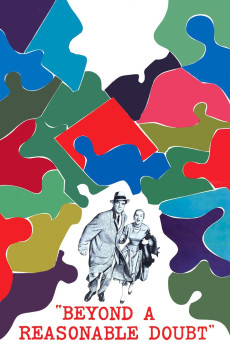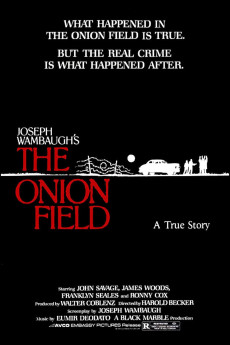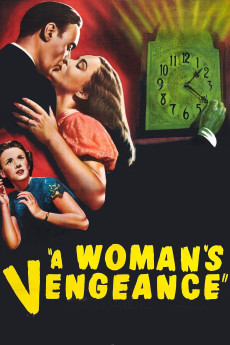Beyond a Reasonable Doubt
A newspaper publisher, wanting to prove a point about the insufficiency of circumstantial evidence, talks his possible son-in-law Tom into a hoax in an attempt to expose ineptitude of the city's hard-line district attorney. The plan is to have Tom plant clues leading to his arrest for killing a female nightclub dancer. Once Tom is found guilty, he is to reveal the setup and humiliate the DA.
The Onion Field
An LA police officer is murdered in the onion fields outside of Bakersfield. However, legal loopholes could keep his kidnappers from receiving justice, and his partner is haunted by overwhelming survivor's guilt.
Death and Texas
Barefoot Bobby Briggs, the legendary running back for the Austin Steers was today sentenced to die for his role in the armed robbery/murder at a downtown Stop 'n Go convenience store... It's five years later, and Bobby's appeals have all but run out, and the Austin Steers are - once again - on the march to the Superbowl, with a lock on the playoffs, when their wide receiver has a season ending injury. With their playoff hopes in shambles, the Governor of Texas controversially offers Bobby a furlough -- from death row -- to help rescue the Steers' post-season hopes, and even play in the Superbowl.
Dance with a Stranger
Ruth Ellis lives with her ten-year old son Andy next to a night club. One night she meets David Blakely, and they start a love affair. However, for David with his upper-class background, it is impossible to uphold the relationship. He breaks up with her, something which makes Ellis, obsessed by him, very upset.
A Woman's Vengeance
A cheating husband is charged in the poisoning death of his invalid wife, in spite of other women and suicide also being suspected.
The Executioner's Song
In this fact-based made-for TV film, Gary Gilmore, an Indiana man who just finished serving a lengthy stay in prison, tries to start anew by moving to Utah. Before long, Gary begins an ill-advised romance with the troubled Nicole Baker, a teenage single mother. As their relationship quickly deteriorates, Gary goes on a murderous rampage, leaving two dead. During his trial, he demands capital punishment; a media circus ensues and outsiders look to profit from his story.
Evidence of Blood
When a brilliant crime writer investigates a 40-year-old murder, he confronts a small town's worst fears.
Rampage
Liberal district attorney decides to seek the death penalty for a man who slaughtered a family at Christmastime, then drank their blood. He escapes, though, and starts killing again.
Coup d'Etat
A freestyle biopic of Ikki Kita, the ultranationalist intellectual whose ideas inspired the failed military coup in 1936.
Into the Abyss
We do not know when and how we will die. Death Row inmates do. Werner Herzog embarks on a dialogue with Death Row inmates, asks questions about life and death and looks deep into these individuals, their stories, their crimes.
Let Him Have It
In 1950s England, slow-witted Derek Bentley falls in with a group of petty criminals led by Chris Craig, a teenager with a fondness for American gangster films. Chris and Derek's friendship leads to their involvement in the true case which would forever shake England's belief in capital punishment.
We Are All Murderers
Originally titled Nous Sommes Tout des Assassins, We Are All Murderers was directed by Andre Cayette, a former lawyer who detested France's execution system. Charles Spaak's screenplay makes no attempt to launder the four principal characters (Marcel Mouloudji, Raymond Pellegrin, Antoinine Balpetre, Julien Verdeir): never mind the motivations, these are all hardened murderers. Still, the film condemns the sadistic ritual through which these four men are brought to the guillotine. In France, the policy is to never tell the condemned man when the execution will occur--and then to show up without warning and drag the victim kicking and screaming to his doom, without any opportunity to make peace with himself or his Maker. By the end of this harrowing film, the audience feels as dehumanized as the four "protagonists." We Are All Murderers was roundly roasted by the French law enforcement establishment, but it won a special jury prize at the 1952 Cannes Film Festival.
×

 Carleton Young
as
Allan Kirk
Carleton Young
as
Allan Kirk
 Edward Binns
as
Lt. Kennedy
Edward Binns
as
Lt. Kennedy
 John Roy
as
Police Officer
John Roy
as
Police Officer
 Joan Fontaine
as
Susan Spencer
Joan Fontaine
as
Susan Spencer

 Richard Herd
as
Beat Cop
Richard Herd
as
Beat Cop
 Michael Pataki
as
Dist. Atty. Dino Fulgoni
Michael Pataki
as
Dist. Atty. Dino Fulgoni
 Bill Morey
as
Lawyer #1
Bill Morey
as
Lawyer #1
 William Sanderson
as
Young Con
William Sanderson
as
Young Con

 Andy Richter
as
Congressman Jack Levanyt
Andy Richter
as
Congressman Jack Levanyt
 Billy Ray Cyrus
as
Spoade Perkins
Billy Ray Cyrus
as
Spoade Perkins
 Bill McAdams Jr.
as
Steve Delongpre
Bill McAdams Jr.
as
Steve Delongpre
 Kim Estes
as
Wal Mart Manager
Kim Estes
as
Wal Mart Manager

 Mike Newell
Director
Mike Newell
Director
 Ian Holm
as
Desmond Cussen
Ian Holm
as
Desmond Cussen
 Lesley Manville
as
Maryanne
Lesley Manville
as
Maryanne
 Stratford Johns
as
Morrie Conley
Stratford Johns
as
Morrie Conley

 Ann Blyth
as
Doris Mead
Ann Blyth
as
Doris Mead
 Mildred Natwick
as
Nurse Caroline Braddock
Mildred Natwick
as
Nurse Caroline Braddock
 Colin Kenny
as
Warder
Colin Kenny
as
Warder

 Richard Venture
as
Earl Dorius
Richard Venture
as
Earl Dorius
 William Sanderson
as
Gibbs
William Sanderson
as
Gibbs
 Rosanna Arquette
as
Nicole Baker
Rosanna Arquette
as
Nicole Baker

 Mary McDonnell
as
Dora Overton
Mary McDonnell
as
Dora Overton
 David Ferry
as
Norwood
David Ferry
as
Norwood
 Sean McCann
as
Theodore Warfield
Sean McCann
as
Theodore Warfield

 William Friedkin
Director
William Friedkin
Director
 Nicholas Campbell
as
Albert Morse
Nicholas Campbell
as
Albert Morse
 John Harkins
as
Dr. Keddie
John Harkins
as
Dr. Keddie
 Art LaFleur
as
Mel Sanderson
Art LaFleur
as
Mel Sanderson
 Andy Romano
as
Spencer Whalen
Andy Romano
as
Spencer Whalen

 Yoshishige Yoshida
Director
Yoshishige Yoshida
Director
 Shintarô Nanjô
as
Shintarô Nanjô
as
 Masao Imafuku
as
Masao Imafuku
as
 Rentarô Mikuni
as
Kazuki Kitamura / Ikki Kita
Rentarô Mikuni
as
Kazuki Kitamura / Ikki Kita

 Werner Herzog
Director
Werner Herzog
Director
 Werner Herzog
as
Self - Narrator
Werner Herzog
as
Self - Narrator

 James Villiers
as
Cassels
James Villiers
as
Cassels
 Vernon Dobtcheff
as
Clerk of Court
Vernon Dobtcheff
as
Clerk of Court
 Michael Elphick
as
Prison Officer Jack
Michael Elphick
as
Prison Officer Jack
